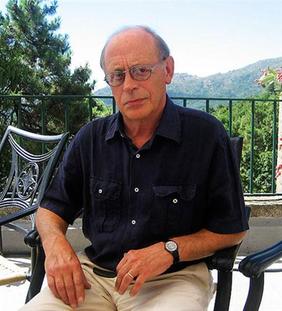"Have you read Antonio Tabucchi?"
I was asked this simple, yet deliciously complex question in 2001 by author Martha Cooley, my instructor that semester in Bennington College's MFA/Writing program. I responded by scribbling the unfamiliar name into a notebook, and subsequently acquired, as fast as possible, every book I could find before immersing myself in a new world. That is, after all, the best answer.
Have you read...?
It's something I've asked people hundreds of times during my life as a writer, bookseller, editor and, above all, reader. Evangelizing the works of authors I love is instinctive. That you are reading this means you know the feeling, too. We are the lucky ones. Maybe we should do this for a living. Oh yeah....
Only the best questions can do what Martha's did for me, however. Gradually, book by book and story by story, Tabucchi altered, ever so slightly, my perception of the world. Among many gifts, his fiction enveloped me in an atmosphere of pure "saudade," a Portuguese word he defined as the "melancholic nostalgia one feels for people, things, pleasures and times now lost."
There is a certain level of complete engagement I always aspire to--and rarely achieve--while reading. As I write these words, I'm listening to fado singer Mariza perform "Meu Fado Meu." Although her voice is recorded, I did hear and see her live in an extraordinary concert seven years ago. Without Tabucchi, I might never have understood (as much as I can) saudade; without saudade, the fado music tradition might have slipped by; without fado, no Mariza.
"Fado to the Portuguese people is like our national soul, but fado is universal and the language is not a frontier," she has said. "Fado is melancholic, but I prefer to call it melancholic happiness. A magical melancholic feeling." "Melancholic" is an apt description of my feelings when I learned about Tabucchi's recent death at 68. After reading the obituaries, I pulled his books from my shelves and flipped through them, searching for underlined passages, the only direct connection I could imagine; a reader's way of mourning.
"Melancholic" is an apt description of my feelings when I learned about Tabucchi's recent death at 68. After reading the obituaries, I pulled his books from my shelves and flipped through them, searching for underlined passages, the only direct connection I could imagine; a reader's way of mourning.
Letters from Casablanca is irresistibly drenched in saudade. As you move from story to story, the realization gradually dawns that there really is no English equivalent for that word. "The Little Gatsby" is a literary game as well as a poignant look at creative and romantic failure. The narrator, whose own reality is debatable, is a one-book wonder of a novelist who entertains his friends by reciting the beginnings of other people's novels (Fitzgerald, Woolf) and is forever sidelined as an observer. Of his love interest, Nicole, he says, "You had a tragic sense of life, perhaps it was your insuperable selfishness." And later: "I would never have known how to write another [novel], even if everyone pretended to think the contrary, much less could I have written the story of our painful history." Of himself: "I was a character transmigrated from another novel, its stylization in a smaller dimension, without grandeur and without tragedy."
The narrator in Requiem: A Hallucination dreams of a torrid Sunday in Lisbon during which he ventures on a quest to meet a man (Fernando Pessoa) he calls "the greatest poet of the twentieth century," while acknowledging the shaky reality of his situation: "I'm dreaming but what I dream seems to me to be real, and I have to meet certain people who exist only in my memory."
Tabucchi furnishes and populates the spectral places he visits--a restaurant, a guesthouse, a museum, a train, even a cemetery--so deftly that he compels us to accept dream and memory without question, as we accept our own world, in which we appear to be sitting in a chair and reading these words. And his sense of humor often catches us by surprise. Someone described the tango as two sad faces, four happy feet. Tabucchi's writing, with its deft narrative touch and saudade, is something of a literary equivalent.
Rereading him, I was also calculating the reader's debt I owe Martha Cooley for asking that first question.
Have you read...?
Reader's debt is the best obligation imaginable. Even Wall Street hasn't figured out a way to monetize it with convoluted hedge fund word bundling schemes. Reader's debt always grows, and with great interest, for all parties involved in the transaction. It is an investment for the longest of terms--a lifetime.
Since I can never repay my reader's debt to Martha, I'll just have to keep spending lavishly by asking everyone who reads this column the simplest question once again: Have you read Antonio Tabucchi?--Robert Gray, contributing editor (column archives available at Fresh Eyes Now)

